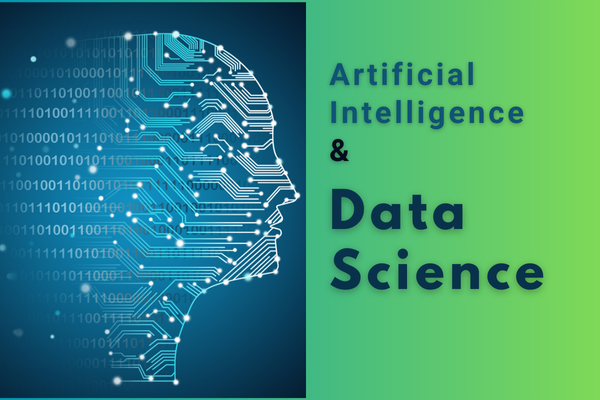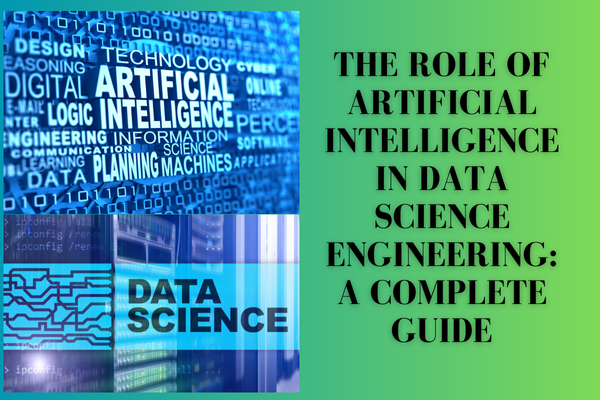Introduction: The Rise of AI and Data Science in Modern Industries
The advent of Artificial Intelligence and Data Science Engineering has been nothing short of revolutionary. Over the last decade, these two fields have converged to bring about profound transformations in various industries, from healthcare to finance, manufacturing, and beyond.
Artificial Intelligence (AI) is a branch of computer science focused on building machines that can mimic human cognitive functions like learning, problem-solving, and decision-making. On the other hand, Data Science Engineering deals with extracting insights and actionable information from large datasets, using statistical, analytical, and computational techniques.
Together, they form a powerful duo, enabling businesses to make smarter decisions, automate processes, and enhance customer experiences. The global market for Artificial Intelligence and Data Science Engineering is expected to continue expanding, as organizations realize the benefits of using data-driven insights and intelligent automation to stay competitive in an increasingly data-rich world.
This blog will explore how Artificial Intelligence and Data Science Engineering are impacting key sectors, contributing to sustainability, and shaping the future of industries.
The Role of AI and Data Science in Revolutionizing Key Sectors
Healthcare
In healthcare, Artificial Intelligence and Data Science Engineering are accelerating advancements in diagnostics, personalized medicine, and drug development. AI-powered tools can analyze medical images, such as X-rays and MRIs, more quickly and accurately than human doctors, helping with early diagnosis and treatment planning. Data science algorithms help process vast amounts of patient data to identify trends and predict outcomes, leading to more precise treatments.
AI-driven systems also assist in drug discovery by simulating the effects of various compounds on biological systems, speeding up the traditionally slow and costly research process.
Finance
The finance sector has embraced Artificial Intelligence and Data Science Engineering for various applications such as fraud detection, predictive analytics, and risk management. AI systems can flag unusual transaction patterns, helping banks and financial institutions identify fraudulent activities more effectively. Data science allows firms to analyze historical data to forecast market trends, aiding in investment strategies.
Additionally, AI enables algorithmic trading, where machines make split-second trading decisions based on complex datasets, far surpassing the abilities of human traders.
Manufacturing
In manufacturing, Artificial Intelligence and Data Science Engineering have brought about transformative changes in automation, predictive maintenance, and supply chain optimization. AI-powered robots are capable of performing intricate tasks with high precision, improving production efficiency while reducing human error.
Data science helps predict when machines are likely to fail, enabling businesses to perform maintenance proactively. By analyzing supply chain data, AI also ensures that resources are allocated efficiently, reducing waste and improving delivery times.
Retail
Retailers are harnessing Artificial Intelligence and Data Science Engineering to personalize the shopping experience. AI algorithms analyze customer behavior and purchasing history to recommend products tailored to individual preferences. This enhances customer satisfaction while boosting sales.
On the operational side, data science is helping retailers optimize inventory management by predicting demand patterns, ensuring stock levels meet customer needs without overstocking.
Transportation and Logistics
In the transportation sector, Artificial Intelligence and Data Science Engineering are driving innovations in autonomous vehicles, route optimization, and smart traffic management. AI enables self-driving cars to navigate through complex environments, while data science helps optimize delivery routes for companies like Amazon and FedEx, reducing fuel consumption and improving delivery speed.
Traffic management systems are also powered by data science, which uses real-time data to alleviate congestion, predict traffic patterns, and improve urban mobility.
AI and Data Science in Sustainability and Environmental Impact
One of the most promising applications of Artificial Intelligence and Data Science Engineering is in sustainability. These technologies can play a significant role in reducing carbon emissions, optimizing energy usage, and promoting eco-friendly practices.
Energy Management
AI-powered systems help optimize energy distribution in smart grids, balancing supply and demand more efficiently. Data science can analyze usage patterns to predict peak demand periods, reducing waste and improving energy efficiency. In renewable energy, AI algorithms are improving the integration of solar and wind power into energy grids, maximizing output and reliability.
Climate Change Solutions
AI and data science are being used to model climate scenarios and predict the effects of various environmental policies. For instance, AI can track deforestation, monitor wildlife populations, and model carbon sequestration processes. By processing large datasets, these technologies enable more accurate climate models that can inform better policy decisions and actions against global warming.
Waste Management
Through the application of AI and data science, waste management systems can predict waste generation patterns, improve recycling efforts, and reduce landfill use. AI-powered robots sort recyclable materials with high accuracy, improving recycling rates.
Challenges and Ethical Considerations in AI and Data Science
While the potential of Artificial Intelligence and Data Science Engineering is vast, there are also significant challenges and ethical issues to address.
Data Privacy and Security
As AI and data science rely heavily on large datasets, protecting user privacy has become a major concern. Data breaches and misuse of personal information can have severe consequences for individuals and businesses. It’s essential for organizations to implement strong data security protocols and adhere to regulations like GDPR to protect sensitive data.
Bias in AI Models
AI systems are only as good as the data they are trained on. If the training data is biased, the AI models can produce unfair or discriminatory outcomes. For example, facial recognition systems have been found to have higher error rates for certain demographic groups. Ensuring diversity in data collection and implementing fairness-aware algorithms is crucial to mitigating these biases.
Job Displacement
The rise of AI and automation may lead to job displacement in certain sectors. While AI can improve productivity and efficiency, it also raises concerns about workers losing their jobs to machines. Reskilling and upskilling programs are essential to ensure that the workforce can adapt to this shift.
The Future of AI and Data Science Engineering in Industry
The future of Artificial Intelligence and Data Science Engineering holds limitless possibilities. Here are some key trends that will shape the future:
Quantum Computing
As quantum computing evolves, it will exponentially increase the power of AI and data science models. Quantum computers can process complex datasets at an unprecedented speed, unlocking new opportunities for industries that rely on large-scale data analysis.
Explainable AI
One of the current challenges of AI is the lack of transparency. Explainable AI (XAI) focuses on creating models that provide human-understandable explanations for their decisions. This will enhance trust and accountability, especially in sectors like healthcare and finance, where decisions have high stakes.
Edge Computing
With the rise of IoT (Internet of Things) devices, edge computing will play a key role in processing data closer to where it is generated, reducing latency and enhancing real-time decision-making. This will revolutionize industries like manufacturing, healthcare, and autonomous vehicles.
Conclusion: The Unstoppable Evolution of AI and Data Science
In conclusion, Artificial Intelligence and Data Science Engineering are no longer just buzzwords—they are actively reshaping industries worldwide. From enhancing operational efficiency to improving customer experiences and driving sustainability, these technologies are proving to be invaluable. The future holds even greater promise, with advancements in quantum computing, explainable AI, and edge computing set to unlock new possibilities.
Embracing Artificial Intelligence and Data Science Engineering will be essential for businesses to stay competitive and drive future growth. Organizations that invest in these technologies now will be better positioned to thrive in an increasingly data-driven world.


